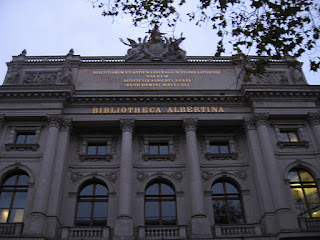In German, the word
Geschichte means both "history" and "story." I don't really know why that fascinates me or surprises me, but I find this word and its two definitions represent my academic discipline very well. I am of the camp that in order to accurately understand history, you must understand people. Each of us writes our own story and, to me, historians are those who are willing to delve deeply into the lives of others, even though such stories are often marred by painful pasts, and act as editors -- sifters of memory and creators of narrative.
Today, I heard the stories of two Germans. I wanted to share them with you because I feel as though my encounters with these people today will be ones that I look back upon years from now, but for each for very different reasons.
As I was walking through a park on my way to school this morning, I saw an elderly gentleman and a woman, who I presume was his aide, walking towards me. I was prepared to smile and nod and brush past them rather quickly, as to make it to my warm classroom a little sooner. As we approached each other, I realized the man was holding out his hand to me. Rather startled, I shook his hand and proceeded to wish him a good morning. I am guessing he presumed I was an American, due to the Stanford sweatshirt I was wearing, and so he spoke to me in English right away. The conversation was pretty standard - I learned all about his children, his grandchildren and his great-grandchildren. His aide was very helpful in translating those rather tricky words like "toddler," for example. I told him about my studies and that I was from California on a study abroad program. Pleasantries. He asked me about Berlin, and I told him how much I really love it here. He was delighted to hear that. The man told me that he had lived in Dahlem (the neighborhood where my school is located) for a very long time. I asked him how long, and he replied, "I moved here, to Berlin, in 1935. And I'm 95 years old, so that's most of my life. It didn't look like this then, though..." After doing some quick mental math, I realized that this man was born in 1916 and moved to Berlin when he was almost my age. I am ashamed to tell you that I could no longer listen to his stories. For the rest of our conversation, all I wanted to know was what he wasn't telling me. What was he doing in 1935? What wasn't he doing? How many of his neighbors "disappeared?" Did he make them disappear? All I could hear was, "...it didn't look like this then..." I freaked out, made up that I was late for class, and dashed off through the park anxious to get inside and try to get rid of the chills that were running up my spine. I am not proud of my reaction. I wish I could tell you that I had the courage to ask him about his experiences during the war, but I was too afraid of what his answer might be. I will remember this story, though, because I felt how the gnawing pains of ignorance turned into unfounded anger against someone I had just met. I will remember how it felt to sit in class afterwards and desperately want to find the man, even though I have no idea what I would say to any of his possible responses. I will remember this story because I realized that knowing the truth, no matter how painful or horrific, is too important to be sacrificed by cowardice and self-preservation.
My second encounter occured while I was eating lunch at the cafe near the Center, working on my final presentation for my German conversation class. A middle-aged German woman sat down next to me, glanced at my computer, and proceeded to ask me whether I was a student at the F.U. (Freie Universität). I responded to her that I was not, in fact, I am an American and have been studying here in Berlin for the past few months. We ended up talking for about twenty minutes about everything from what I am studying (Geschichte - ok, Jüdische Geschichte, to be precise) to her life, her brother's English-speaking girlfriend, her children (Viktoria, 12 and Christoph, 9), her Dutch-speaking best friend, Viktoria's dance classes - I think you get the idea. She was delighted to hear that I have two Sprachpartners (Language buddies) and that I am finally reading German newspapers (I didn't mention that I don't get much beyond the headlines). After she finished her soup, she stood up to leave and said, "You truly are a German student!" and then she left. It took me a second to understand that she meant I was not a student of German, but a German student. It was only then that I realized that I hadn't spoken English the entire time.
I spoke with two strangers today. One conversation highlighted an unavoidable part of life here in Germany - the tragic past that doesn't remain in the past, it made me uncomfortable, and reminded me why it is so important to learn the whole story before crafting a narrative. The other made me feel more proud and more authentically German than I have ever felt. Both of these stories, though, are ones for the history book...






